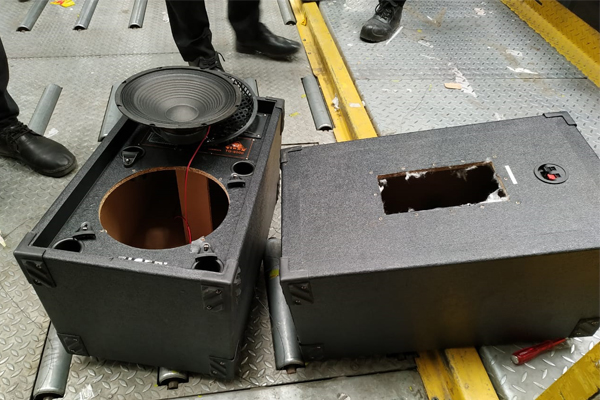Law & Politics
Cairo Airport Officials Found a Smuggled Mummy’s Limbs Hidden in a Hollowed-Out Loudspeaker
X-rays helped officials spot the suspicious package before it could leave the country.

X-rays helped officials spot the suspicious package before it could leave the country.

Eileen Kinsella

Customs officials at the Cairo International Airport recently made a most unusual discovery. Hidden inside a hollowed-out speaker they found several mummified limbs from two different bodies.
The pieces were later identified as six parts of two mummies, along with the remains of mummification and resin, according to Iman Abdel-Raouf, director general of the archeological ports. These included “parts of the foot, right and left leg, left hand, upper part of the right arm adhering to part of the thoracic cage of the second mummy, as well as the lower part of the left hand of the same mummy,” said Abdel-Raouf in a statement.
Officials spotted the mummy parts while x-raying a parcel scheduled to be shipped to Belgium. To date, Egyptian authorities have not revealed the identity of the person responsible for the attempted smuggling or confirmed whether there are any charges.
#Egypt foils a #smuggling attempt of #mummies’ remains before traveling to Belgium. They are now at the #EgyptianMuseum for #Restoration #mummy #Media #news #antiquity #ministry #MinistyofAntiquities pic.twitter.com/XhIfE88Yfm
— Ministry of Antiquities-Arab Republic of Egypt (@AntiquitiesOf) February 24, 2019
Hamdy Hammam, head of Egypt’s Central Department of Ports and Antiquities, said that the Ministry of Antiquities immediately set up a special committee in the passenger buildings at Cairo International Airport. The recovered mummy parts will be brought to the Egyptian Museum in Cairo and a team of archaeologists will inspect and conserve them, the Ministry said.
Lootings and smugglings have intensified in Egypt since the 2011 revolution, the New York Times has pointed out. Since then, the country has lost an estimated $3 billion to illegal smuggling, according to the Antiquities Coalition, a nonprofit US organization that tracks antiquities looting and trafficking.
In 1983, Egypt passed a law to protect antiquities, known as Law No. 117, which stipulates that all antiquities, art, and artifacts—including mummies—are subject to regulation and considered the property of Egypt. Offenders are subject to fines and up to two years in prison.